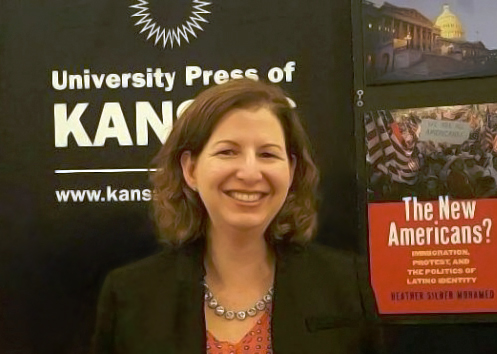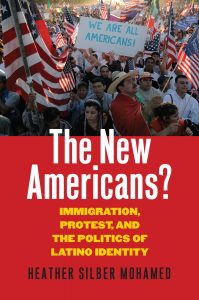 My book, The New Americans? Immigration, Protest, and the Politics of Latino Identity (University Press of Kansas, 2017), analyzes how protest and the immigration debate influence Latinos’ sense of belonging in the U.S. The book focuses primarily on the unprecedented protests of 2006, in which millions of Latinos mobilized in opposition to a far-reaching immigration proposal. Using an innovative natural experiment, I find that the distinct frames (messages) advanced during the 2006 protests – that Latinos are American – led group members to think differently about what it means to be American. Additionally, Latinos surveyed after the protests were more likely to see themselves as American than those interviewed before. These findings counter existing research, which assumes that in contexts of political threat, minority groups will embrace an alternative identity, rejecting that of the majority group (ie, American).
My book, The New Americans? Immigration, Protest, and the Politics of Latino Identity (University Press of Kansas, 2017), analyzes how protest and the immigration debate influence Latinos’ sense of belonging in the U.S. The book focuses primarily on the unprecedented protests of 2006, in which millions of Latinos mobilized in opposition to a far-reaching immigration proposal. Using an innovative natural experiment, I find that the distinct frames (messages) advanced during the 2006 protests – that Latinos are American – led group members to think differently about what it means to be American. Additionally, Latinos surveyed after the protests were more likely to see themselves as American than those interviewed before. These findings counter existing research, which assumes that in contexts of political threat, minority groups will embrace an alternative identity, rejecting that of the majority group (ie, American).
My book was named the Best Book of 2017 by the American Political Science Association Latino Caucus, and has been reviewed in Perspectives on Politics, Political Science Quarterly, the Journal of Race, Ethnicity, and Politics, Contemporary Sociology, Great Plains Research, and Choice Reviews.

Table of Contents
- Chapter 1, “We Are America”
- Chapter 2, Becoming American: The Politics-to-Identity Link
- Chapter 3, From Assimilation to Nationalism to “We are America”: Immigration Law, Social Movements, and Identity Politics, 1900s-2006
- Chapter 4, The Immigration Paradox: Latino Policy Priorities and the Limits of Pan-Ethnic Unity
- Chapter 5, Defining American: Identification, Political Socialization, and Protest Politics
- Chapter 6, American Identities: Self-Perception among Latinos in the United States
- Chapter 7, Can Protests Make Latinos “American”? The 2006 Marches and the Politics-to-Identity Link
- Chapter 8, Epilogue
To listen to my podcast interview about the book with the New Books Network, please click here.